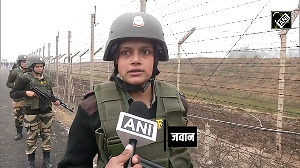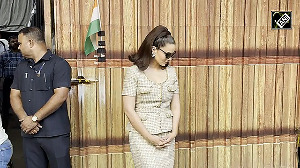On the eve of his return home, former Pakistan Prime Minister Nawaz Sharif has vowed to set up a commission if elected to power to fix responsibility for the 'tragic' Kargil conflict even as he admitted that he had 'let down' his then Indian counterpart Atal Bihari Vajpayee.
Maintaining that Pervez Musharraf was behind the 1999 Pakistani aggression in Kargil without his knowledge, he said the then Army Chief had 'subverted' the process of improving relations with India and that he regretted not having taken any action against him.
Favouring friendly and peaceful relations with India, Sharif told Karan Thapar's India Tonight programme for CNBC that the Kargil incident continues to 'haunt' him and will be remembered in the history of bilateral relations.
'Kargil was a very tragic incident in the history of the relations between the two countries....I wish it had not happened,' said the PML-N leader who was ousted as the Prime Minister by Musharraf in a bloodless coup three months after the Indo-Pak conflict.
'After Kargil, the Indian prime minister had said he was let down by the Pakistani prime minister (Sharif). I think he is justified in making the remarks. I accept that,' Sharif said.
Insisting that he had no knowledge of Musharraf's plans about Kargil, Sharif said there were tapes to prove it.
He regretted not having set up a commission like India to go into the Kargil episode to fix the responsibility for it.
'I did not take certain actions, which should have been taken,' said Sharif, who was imprisoned after the coup and then forced into exile in 2001 by Musharraf.
Asked whether he would set up such a commission if he becomes the prime minister again, Sharif replied in the affirmative.
On whether Musharraf could be questioned by the commission, he said it was for the panel to decide.
'He (Musharraf) is not above the law of the land... If I can appear before the court of law, I appeared before the Supreme Court as prime minister, why can't he do that,' queried Sharif, who plans to return home on Monday to contest the upcoming general elections.
The former premier also regretted appointing Musharraf as army chief and then promoting him after Kargil conflict to the post of Joint Chief of Staff.
On relations with India, he said he would pick up the threads from where he has left, but will first have to see what has happened in the last eight years to decide the future course of action.
'I don't recognise Musharraf. He is not the legitimate ruler of Pakistan. I don't have to go by what Musharraf says,' he said, when asked about the President's claim that relations have improved with India.
He said Musharraf's decisions, including in relation to India, do not have the endorsement of Parliament where issues need to be discussed thoroughly.
He went on to add that both India and Pakistan will have to 'move away from stated positions' and think in a very independent manner, failing which 'we cannot go anywhere.'
Kashmir, he emphasised, is the core and the most important issue between the two countries.
On domestic politics, Sharif said he was 'dismayed and disappointed' at Benazir Bhutto for 'cutting a deal' with Musharraf thus 'lending a hand of support to the sinking ship' of the 'dictator.'
He said it was 'unfortunate' that Bhutto, despite pledging to work for restoring democracy, was engaging in 'give and take' with Musharraf at a time when the latter is 'on his way out.'
Sharif made it clear that he was not ready to accept Musharraf in any role even if he gives up the post of army chief and President.
'We don't accept him neither in uniform nor otherwise,' he said, asserting the army has no role in Pakistani politics and needed to be reformed.
The former prime minister asked the US to choose between democracy and dictatorship and that it 'cannot equate Pakistan with Musharraf.'
He said people of Pakistan are disenchanted with the policies of the Bush administration.
He said he was determined to go back to Pakistan and was 'not deterred' by reports quoting government sources that he may be jailed on his arrival in the country or deported to Saudi Arabia.
'I think Musharraf is running here and there. He is also trying to pressurise anybody that he could. The Saudis are talking to me ... but looking at the situation in Pakistan, I think Pakistan needs me today,' he said.
'Musharraf has threatened me with dire consequences. Sometimes he says he will take me to jail from Islamabad airport. Sometimes news comes that the cell in the Attock fort has been readied for me. But I am not deterred,' he asserted





 © 2024 Rediff.com -
© 2024 Rediff.com -